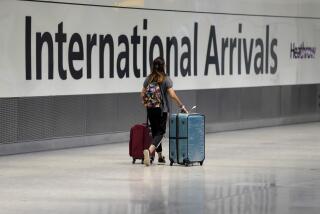Adjusting to Security at Foreign Airports
- Share via
Airports in the United States have made radical changes in security since Sept. 11, forcing domestic travelers to adapt. But how have foreign airports changed? And what are the new ground rules for international business travelers?
Here’s what four global road warriors say:
*
Europe
Andre LaCroix, president, Burger King International
LaCroix said Sept. 11 has forced travelers to be more efficient about planning their trips. LaCroix flies two or three times a week from Munich, Germany, where he oversees 3,066 Burger Kings in 56 countries.
“The biggest impact of Sept. 11 is that it forced us to reassess our travel needs,” LaCroix said. “It forced us to use the video conference call. We learned to do things differently.”
Though he still flies as much as in the past, LaCroix packs more activity into each trip and tucks in intermediate stops. For example, on a recent trip to corporate headquarters in Miami, he flew via Madrid to get in a quick meeting there instead of going nonstop. “We’re more organized,” he said.
Security checks at Munich International take 10 minutes to 15 minutes at early-morning rush hours. He had some razor blades confiscated in Frankfurt, Germany, recently, but generally he hasn’t changed his packing habits.
Although European airports have a reputation for being more security-minded than their U.S. counterparts, LaCroix said it is not monolithic. “There are some differences between airports,” he said. LaCroix also is accustomed to seeing armed police at airports in Europe and the Middle East.
*
Asia
Philip Shen, president, Asia- Pacific division of Leggett & Platt, Sunrise, Fla.
Shen travels every other month from South Florida through Chicago or airports on the West Coast to Asia in his job for Leggett & Platt, a $5-billion maker of fabricated parts and furniture components based in Carthage, Mo.
Shen has observed few changes in security at airports in Asia since Sept. 11, but he noted that they tend to be laid out differently from U.S. terminals. Rather than have travelers put bags through metal detectors at concourse entrances, he said, airports in Singapore and Kuala Lumpur, Malaysia, screen at each departure gate.
In addition, the gate waiting areas are enclosed by glass walls. Anyone leaving once admitted must be rescanned. “It’s better in terms of security,” Shen said.
As for packing, Shen has long limited himself to a single carry-on even though he is gone for up to three weeks on his Asian tours. He gets by with four interchangeable outfits. With more, he said, “you just end up carrying dirty laundry from country to country.”
Doing it that way saves a few hours on every trip, he said, with the extra advantage that he never loses luggage along the way.
*
Latin America
Stephen Roof, aviation attorney, Shutts & Bowen, Miami
Roof said security in Latin America has become more like Europe’s since Sept. 11, while security in Europe is more like Israel’s.
“Before you almost never encountered security searches” while checking baggage in Latin America, he said. But on a recent trip through Mexico City, Roof said, both his check-in and carry-on bags were opened. “The search was pretty thorough too,” he said.
Also, U.S. airlines operating abroad seem less willing to accept transfers of luggage from foreign carriers without re-screening the bags, he said.
In Europe, he said, there is “definitely heightened vigilance,” although security generally has been tougher since the 1988 bombing of Pan Am Flight 103.
One change, Roof said, is in the profiling interviews passengers face before getting in line for check-in. Before Sept. 11, local employees of U.S. carriers conducted the interviews. Now one or more American workers join in. “It’s a more skillful interview, more probing. People are actually paying attention to your answers,” he said.
Roof has changed his flying routine little, but he does allow more time to get through London’s Heathrow Airport. “Connections that used to work no longer work,” he said, because of the extra time needed to do screenings.
*
Europe
Alfredo Gonzales, director of international sales, Greater Fort Lauderdale (Fla.) Convention & Visitors Bureau
After Sept. 11, Gonzales relearned how to pack. “I will not take anything I don’t need,” he said. That means two suits instead of four, and he has pared his three suitcases to one. “Take very little in your hand--just a briefcase, your laptop and a cell phone.”
“Now you pack a Reader’s Digest version of what you packed before,” he said.
Gonzales also pays attention to things that might result in his getting pulled out of line. He buys fewer duty-free items as gifts and strictly follows written customs guidelines. “You don’t want to push the envelope now,” he said.
He learned his lesson in Amsterdam. Gonzales was taking a British bobby’s hat as a gift to a friend in England. The souvenir was packed in a hatbox. Both hat and box drew attention, but he was allowed to keep them after a five-minute interview.
Gonzales said he is flying less, partly because of the hassle.
“I’ve learned to combine three trips into one,” he said, “so I don’t have to fly so much.”
More to Read
Sign up for The Wild
We’ll help you find the best places to hike, bike and run, as well as the perfect silent spots for meditation and yoga.
You may occasionally receive promotional content from the Los Angeles Times.






